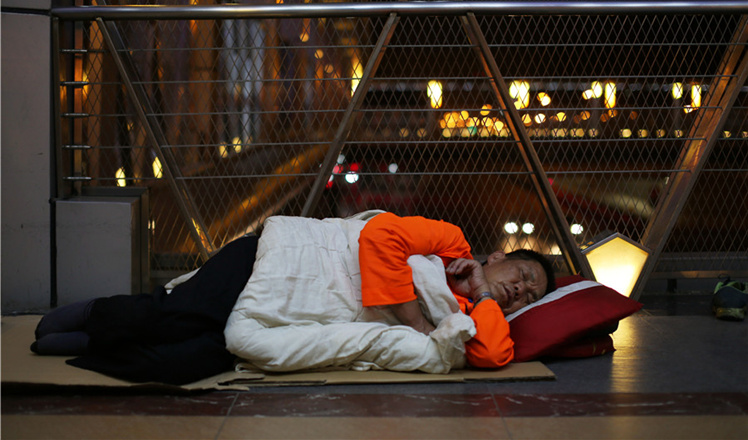College students in China: Are they critical thinkers or not?
Updated: 2016-08-03 11:07
By Matthew Turncr(China Daily USA)
|
||||||||
Can college students in China do critical thinking?
That question was answered by a headline in The New York Times on July 30 atop a Stanford University study of Chinese education: "Study Finds Chinese Students Excel in Critical Thinking. Until College."
The study of Chinese education shows that Chinese high school students perform above international averages, but this trend either stagnates or drops during college. By looking at scores and other data, the study concludes that happens because of a lack of "critical thinking".
In its assessment of problems in Chinese education, the study is largely correct. But it also assumes that critical thinking can be taught by reorienting education around skills- and jobs-based models. The two have little to do with each other.

I know this because I taught high school and college in Beijing for six years. And like anyone who has been on the inside of the Chinese educational system as a teacher or a student, I will readily admit that there are many problems - but a lack of critical thinking is not one of them.
Classes can be overcrowded and attention appears to be paid mostly to quantitative data. With a declining job market, many students also feel that their schools are not preparing them for life after graduation. But this has little to do with critical thinking.
Whether or not "the Chinese educational system kills creativity and kills innovation", as Eric X. Li, an entrepreneur and a sponsor of the study, says in the article, is simply beside the point. The study is confusing critical thinking with what one needs to get a job - which is largely a robust economy.
If one wants to see critical thinking on Chinese college campuses, it can be found easily, just not necessarily where one expects.
During the time I taught, I had a range of students from different economic strata and with different life goals. At one school, students who wanted to major in the natural sciences were assigned to the department of foreign languages, where I taught American literature.
In my classes there I would often have unenthusiastic students, but I also had many students that surprised me. They comprehended on a high level what we were studying, and I found many students both curious and eager to work hard. If possible, some wanted to contribute something to the field.
In other words: critical thinking and innovation.
Later I realized that I'm not an especially gifted teacher or scholar - certainly no more than the thousands of other educators in China. I also taught students zero about job skills. I taught literature, after all.
So why did my students demonstrate exactly the qualities that the Stanford study says are lacking when it claims to "measure critical thinking"?
I asked James Williams, a professor of history at Renmin University of China, one of the top universities in China, what he thought the reason was: "I think the major issue is that students are not asked to engage in critical thinking at the university level. If you ask them to be critical of a text or idea they are more than happy to oblige," he said.
This speaks to my point. By claiming to measure critical thinking and then offer technical or job-based solutions, the Stanford study misses the mark. In a forest of solutions and data, all that was needed was to ask students what they thought the problems with Chinese education were.
The students interviewed for the article needed critical thinking skills even to answer the questions posed, so where is the lack?
The solution to some problems in the Chinese education system may indeed lie partially in better job skills and smaller classes, but that has little to do with critical thinking.
If one wants to see critical thinking, one simply needs to listen to what students have to say.
Contact the writer at matthewturner@chinadailyusa.com.
- Paragliding fans fly over Rigi mountain in Switzerland
- DPRK fires 1 ballistic missile into east waters
- Tokyo's white paper on defense policy 'full of lies'
- Syrian gov't, opposition trade accusation of alleged chemical attacks
- Obama calls Republican nominee Trump "unfit" to be president
- 5 feared dead as Russian helicopter shot down

 Serbian artist creates incredible 3-D art
Serbian artist creates incredible 3-D art
 Glimpse into the work and life of G20 guards
Glimpse into the work and life of G20 guards
 Shopping and throwing Frisbee in virtual reality
Shopping and throwing Frisbee in virtual reality
 Take a closer look at the life in Rio Olympic Village
Take a closer look at the life in Rio Olympic Village
 From dusk to dawn: The other side of Beijing
From dusk to dawn: The other side of Beijing
 Huangluo: China's 'long hair village'
Huangluo: China's 'long hair village'
 Typhoon Nida lashes Shenzhen
Typhoon Nida lashes Shenzhen
 Amazing robots work hard at Qingdao beer fest
Amazing robots work hard at Qingdao beer fest
Most Viewed
Editor's Picks

|

|

|

|

|

|
Today's Top News
US launches airstrikes against IS targets in Libya's Sirte
Ministry slams US-Korean THAAD deployment
Two police officers shot at protest in Dallas
Abe's blame game reveals his policies failing to get results
Ending wildlife trafficking must be policy priority in Asia
Effects of supply-side reform take time to be seen
Chinese State Councilor Yang Jiechi to meet Kerry
Chinese stocks surge on back of MSCI rumors
US Weekly

|

|







